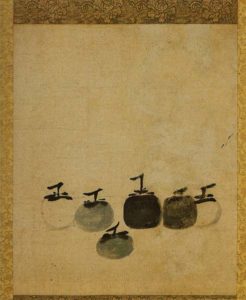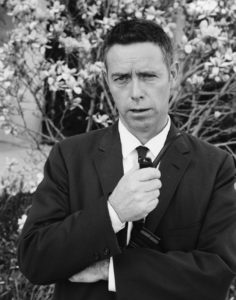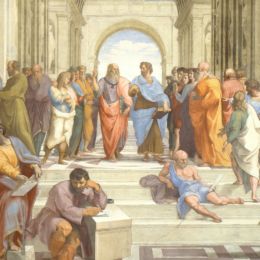Alan Watts was born on this day in 1915. A prolific scholar and dazzling stylist, Watts is best known as the chief popularizer of Asian philosophy for the Beat and Hippy movements, but he was also an original thinker in his own right and a quiet man of the Right. In commemoration of his birth, I wish to draw your attention to these works at Counter-Currents: (more…)
Tag: Eastern philosophy
-
1. Knowledge of the Right Use of All Things
To explain what philosophy is, we always have to go back to the beginning. Pythagoras (ca. 570-495 BC) is said to have been confronted by Leon, the tyrant of Philius, who demanded to know if he was wise. He responded that he was not a wise man, but merely a φιλόσοφος (philosophos), a “lover of wisdom”; a practitioner of φιλοσοφία (philosophia). Φίλος (philos) means “love,” and σοφῐ́ᾱ (sophia) means “wisdom.” (more…)
-
Alan Watts was born on this day in 1915. A prolific scholar and dazzling stylist, Watts is best known as the chief popularizer of Asian philosophy for the Beat and Hippy movements, but he was also an original thinker in his own right and a quiet man of the Right. In commemoration of his birth, I wish to draw your attention to these works at Counter-Currents: (more…)
-
 1,489 words
1,489 words 1,489 words
1,489 wordsAuthor’s note: Cited passages are taken from the 1988 Stephen Mitchell translation, London, Macmillan.
Tao Te Ching, the “Book of the Way,” was ostensibly composed by the pseudonymous Lao Tzu, about whom next to nothing is known, sometime around the time of Confucius (551-479 BC). It’s things like this that add even more irresistible mystique to this slender volume, (more…)
-
3,008 words
Translated by G. A. Malvicini
Elsewhere (in La Destra, in May 1972), we have discussed the necessary relationship of an authentic, non-makeshift Right with the concept of Tradition. In the sense discussed there, references to authors with a traditional orientation may be useful in dealing with certain complex problems. Here, however, we wish to provide an account of the ideas of René Guénon (1886-1951), who was regarded as the proponent of “integral Traditionalism.” (more…)
-
Inspired by the unique revaluation of Alan Watts on Counter-Currents, I want to share my reflections on two decades of studying the “wisdom of the East” which Watts helped to popularize in his lifetime.
Indeed, I remember when I read Psychotherapy East and West
, my first Watts book and also one of the first books I read about Eastern philosophy and religion. (more…)
-
Translation anonymous, edited by Greg Johnson
Editor’s Note:
The following essay was originally published in English in East and West, vol. 2, no. 1 (April 1951): 23–27. This is chapter 1 of Julius Evola, East and West: Comparative Studies in Pursuit of Tradition, ed. Greg Johnson, forthcoming from Counter-Currents in the summer of 2013.
-
1,598 words
Translated by Greg Johnson
Czech translation here
Translator’s Note:
The following text, published in 1942 or 1943 under the title “Baron von Ungern Venerated in Mongolian Temples,” deals with one of the 20th century’s most enigmatic figures whom I first encountered in the pages of Ferdinand Ossendowski’s brilliant Beasts, Men, and Gods.
-
A number of years ago I went through a long period of depression, and when I found myself coming out the other end of it, I developed an interest in “Eastern Philosophy.”
-
Alan Watts is one of my favorite writers. Born in Chislehurst, Kent, England, Watts was raised an Anglican, but became a Buddhist at age 15. In 1941, while Watts was living in New York City, his first wife Eleanor had a mystical vision of Jesus. This led him to return to Anglicanism.
-
French translation here
Alan Watts
Does It Matter?: Essays on Man’s Relation to Materiality
New York: Vintage, 1971








